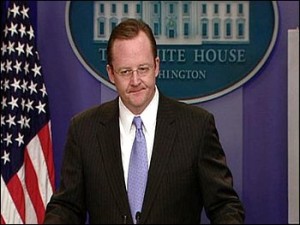
White House press secretary Robert Gibbs announced Wednesday that he is leaving the administration in the coming days, saying he will play an outside advisory role and give speeches before helping President Obama gear up for the 2012 campaign.
Gibbs, addressing reports of his departure at his daily briefing for the first time, said the major staffing changes about to hit the White House will benefit Obama.
“You have to admit there’s a bubble in here to some degree,” Gibbs said.
The decision to leave the White House for the private sector came as something of a surprise: Gibbs, 39, has worked by Obama’s side for nearly seven years, and other advisers had expected him to move into a senior advisory role. One of his colleagues said just a few months ago that Gibbs could be counted on to last all eight years if Obama were reelected – and would be the one to “turn out the lights.”
Gibbs had also been rumored to be a potential chairman of the Democratic National Committee. But the current DNC chairman, Tim Kaine, said he would not leave the post. And amid a broader personnel reshuffling – and with former campaign manager David Plouffe assuming a major job in the West Wing starting Monday – it became difficult to see what portfolio Gibbs would manage if he remained inside the administration as a senior adviser, one official said.
With the the 2012 campaign rapidly approaching, the new arrangement will give Gibbs the flexibility to help the president from the outside. But first, he said, he plans to decompress – and drive his young son to school.
“Obviously, this was not an easy decision,” he told reporters who peppered him with questions about how he had decided to leave. “I think this is a very natural time period to make the decision to recharge a little bit.”
His last day will be in the beginning of February, he said. He said he expects his successor to be named before then. A full staff sweep is on the way, with Obama planning to announce his his head of the National Economic Council, replacing outgoing Lawrence Summers, on Friday during a visit to a window manufacturer in the Washington area. Obama will then name his permanent chief of staff — former Commerce secretary William Daley appears to be the frontrunner. That announcement could happen Friday or early next week.
Gibbs said Obama has not spoken to Daley so far this week. But when asked whether that conversation could occur, he replied: “It’s certainly possible, yes.”
In addition to those three vacancies, there are at least five other key positions the president must fill in the days ahead: two deputy chiefs of staff; a new director of the Office of Public Engagement to replace Tina Tchen, who will be Michelle Obama’s chief of staff ; a potential new political director; and a possible replacement for Peter Rouse, who left his senior adviser post to become interim chief of staff.
White House aides said Gibbs began telling his colleagues about his plans over the last few days, evoking an emotional response. Like departing White House senior adviser David Axelrod and Plouffe, Gibbs has been “universally adored” by the people who work for him, always ready with a homespun Alabama quip or a joke, even during tense times, said White House spokesman Tommy Vietor, who has worked with Gibbs for nearly the duration of Obama’s presidency. “He is someone you know would go to bat for you and has your back all the time.”
Judgments from the outside were not always as generous. Gibbs sparred frequently with reporters, sometimes in ways viewed as glib or condescending. He made frequent promises from the podium to answer questions later in the day, then did so only occasionally. Colleagues joked that he enjoyed spending time in meetings with the president more than calling reporters back.
But Gibbs did go to bat for the press on several memorable occasions, scuffling with Chinese officials during a trip to Copenhagen over access for the White House press corps, and again during a trip to India last November. His enthusiasm for the job appeared boundless, and unlike many of his predecessors, he had wide-ranging access to the president and top-level meetings, lending his answers from the podium a high degree of credibility.
Beyond giving speeches and advising Obama from the outside, it is not entirely clear what work Gibbs will now do.
He did not rule out taking on corporate clients, saying he would do so if he felt comfortable with them. He did, however, say he has no plans to write a book in the near future.
And the president, Gibbs said, will likely be his last political client: “Seems like a pretty good one to stop on.” WP

Leave a Reply
You must be logged in to post a comment.